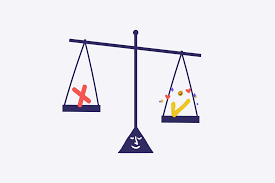The Importance of Ethical Behavior in Today’s Society
Ethics play a crucial role in shaping the fabric of society. In a world where technological advancements and globalization have interconnected us more than ever, the need for ethical behavior has become increasingly vital. Ethical behavior encompasses honesty, integrity, fairness, and respect for others.
One of the key reasons why ethical behavior is essential is that it builds trust. When individuals and organizations act ethically, they demonstrate their commitment to doing what is right. This fosters trust among stakeholders, whether they are customers, employees, or the community at large.
Furthermore, ethical behavior contributes to a positive reputation. In today’s digital age, news spreads rapidly, and any unethical conduct can tarnish an individual’s or organization’s image. By upholding ethical standards, individuals and organizations can safeguard their reputation and build credibility.
Moreover, ethical behavior promotes fairness and equality. It ensures that everyone is treated with respect and dignity, regardless of their background or status. This creates a more inclusive and harmonious society where individuals feel valued and respected.
Lastly, ethical behavior leads to long-term success. While unethical practices may yield short-term gains, they often result in long-term consequences such as legal issues or loss of trust. On the other hand, acting ethically paves the way for sustainable growth and success by fostering strong relationships based on mutual trust and respect.
In conclusion, ethical behavior is not just a moral imperative but a practical necessity in today’s society. By upholding ethical standards in our actions and decisions, we contribute to building a more trustworthy, fair, and successful world for all.
Understanding Ethics: Definitions, Examples, and Key Concepts
- What does ethical stand mean?
- What is the meaning of being ethical?
- What are ethical and examples?
- What is the meaning of ethical terms?
What does ethical stand mean?
The term “ethical stand” refers to an individual’s or organization’s stance on ethical principles and values. It signifies a commitment to upholding moral standards and conducting oneself in a manner that aligns with these values. Taking an ethical stand involves making decisions and taking actions based on what is considered right or wrong, just or unjust, in a given situation. By defining their ethical stand, individuals and organizations demonstrate their dedication to integrity, honesty, fairness, and respect for others in all aspects of their conduct.
What is the meaning of being ethical?
Being ethical means adhering to a set of principles and values that guide one’s behavior towards what is considered right and just. It involves acting with honesty, integrity, fairness, and respect for others in all aspects of life. Ethical behavior entails making decisions that consider not only one’s own interests but also the impact on others and society as a whole. By being ethical, individuals demonstrate a commitment to upholding moral standards and doing what is morally right, even when faced with difficult choices or temptations. Ultimately, being ethical is about striving to do the right thing in every situation, regardless of personal gain or convenience.
What are ethical and examples?
Ethics refer to a set of moral principles that guide individuals and organizations in distinguishing right from wrong. Examples of ethical behavior include honesty, integrity, respect for others, fairness, and accountability. For instance, being honest in communication, respecting diversity, treating others with fairness and equality, and taking responsibility for one’s actions are all examples of ethical conduct. Upholding ethical standards not only benefits individuals by fostering trust and credibility but also contributes to creating a more harmonious and just society.
What is the meaning of ethical terms?
Ethical terms refer to the language and concepts used to define and discuss principles of right and wrong conduct, moral values, and standards of behavior. These terms encompass a wide range of ideas related to ethics, including honesty, integrity, fairness, justice, respect for others, and adherence to societal norms. Understanding ethical terms is essential for individuals and organizations seeking to navigate complex moral dilemmas and make decisions that align with ethical principles. By clarifying the meaning of ethical terms, we can enhance our ability to engage in thoughtful discussions about morality and uphold ethical standards in our actions and interactions with others.

